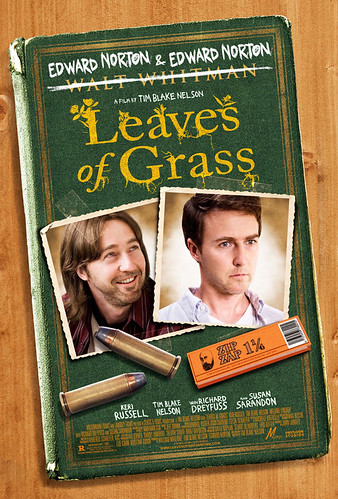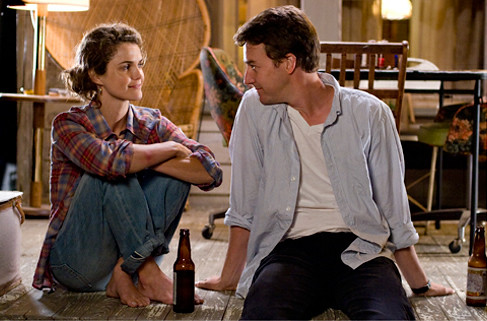Geekscape Reviews Tim Blake Nelson’s “Leaves of Grass”!
One of the biggest surprises I experienced at this year’s SXSW was Tim Blake Nelson’s film Leaves of Grass starring Ed Norton… and Ed Norton. The movie is about Bill, a Brown classics professor days away from accepting a prize residency at Harvard, who is called home to small town Oklahoma on the news of his estranged twin brother Brady’s death. While Bill has spent years running as far from his redneck past as possible, Brady stayed in Oklahoma where he could take care of their mom (Susan Sarandon) and use his superior scientific intelligence to grow a monopoly in the marijuana growing business. Bill discovers upon arriving that Brady lied about his death to get him to show up so he can use Bill as an alibi to worm his way out of the debt he owes a local Jewish businessman (and small time kingpin) played by Richard Dreyfuss. In the course of doing so, Bill discovers feelings for hometown girl Janet (Keri Russell) and that he might have been too quick to run from his past. This journey of rediscovery takes Bill through more than a few complicated situations, complicated even further by the ruse that Brady has forced on him and most of the town.
But if it all sounds a bit too complicated… it’s not. The greatest testament to Nelson’s writing and directing, and star Ed Norton’s carefully choreographed and inventoried character work, is that it’s not confusing at all. Even when Bill and Brady are on screen together, acting against each other (or against themselves as it may be), I never spent more than a split second early on in the film distracted by “the trick”. What Nelson and Norton have pulled off here is so impressive that you really do question if Norton has been cloned.
Most films trying for the same effect usually fall into showing off for the audience, insecurely pointing a spotlight on few gimmicky shots or sequences as a way of reminding the audience that there’s a magician behind the act. Having interviewed Tim and Edward for an interview with Geekscape, it’s obvious that Nelson’s approach was the exact opposite. Great lengths were taken early on to make sure that everything was in service to the story and characters and that no distractions remained. As Norton put it, “we had a very, very clear road map of how we were gonna handle it technically. That way at least you’ve got a little more room to breathe (as an actor).” It was these small pieces, Bill fixing Brady’s collar or one brother socking the other in the arm, that sold the believability of the effect more than anything. “The only thing that I wanted us to be careful of was that the twins never seemed like a trick. That you stopped looking at the seams and felt that these were guys inhabiting the same space and interacting with each other in a very extemporaneous way.”

According to Tim, who also appears in the film as Brady’s best friend Bolger, it was complicated work for Norton and he to piece through. ”To play these twins, it really was quite a juggling act. It takes a rare mind to be able to map out a scene as Character A in a way that’ll leave room for Character B and how that character might respond. So it’s almost as if it was a cubist way of thinking. You’re looking at the scene from all sorts of angles… technically there were all sorts of challenges, but the root of it was Edward’s talent.”
And beyond the technicalities of building a believable dual performance, the movie really does have room to live and breathe in some interesting and smart places. Through multiple story complications, Nelson’s script remains clear, honest and smart, and even when it looks like it’s headed to overplaying it’s hand and losing its balance in a few parts, it surprises you. Towards the end of the film, I began to feel like Bill was reaching in places that were out of character for him and placing himself in situations that were unbelievable only to find a surprising resolution that was more satisfying than had the script not gone to those extremes or stretched it’s boundaries. Leaves of Grass introduces you to the main characters, and like Bill’s own layers of self-rediscovery, re-introduces you to them as they change over the course of the script. “You know when you’re being driven by someone who knows where they’re going and you feel that when you read his script and I think you can feel it when you see a movie. It was clearly a movie that only Tim knew how to make because he owns it all.”
In talking with Nelson, you soon realize that both he and Norton are severely invested on an intelligent level with the story that they are telling. They are carefully picking through the story, the performances and the characters. “Any questions I had about whether a redneck from Oklahoma could become a Brown classical philosophy professor were ended when I met Tim.” And as Norton put it about his director, seeing Brady, Bill and Keri Russell’s wise poetry teacher Janet exist in this usually caricature-depicted, Southern world adds credibility to their characters and the actions surrounding them instead of a sense that these people don’t belong. “I grow tired of intelligence having such a limited manifestation in movies… I was eager to debunk certain stereotypes about Southern characters in this movie” says Nelson.

And even with Norton putting on two solid performances at once, every actor in the film really delivers, most noticeably Kerri Russell, who I don’t remember falling for in the same way I did for Janet as she helps Bill navigate the perils of coming back home. “She gives the Bill character the wisdom that allows him to move forward in his life as it’s collapsing around him.” The simple relationship between them that turns a polished Ivy Leaguer into someone who has to look at everything anew really grounds the movie and gives the audience a clear perspective for everything else that happens throughout. “You dream as an actor’s director of being able to let moments dream in 2-shots. And one of my favorite moments in this movie is just letting the camera sit on Edward and Kerry on that porch in a 2-shot when he tries to kiss her. It goes on for several minutes and I never had to cut to a close up.”
Ultimately, it’s that moment that sums up Leaves of Grass the best. It’s a simply told story that lives comfortably within its own confidences and doesn’t sell itself short by trying to dazzle you with the techniques it has enlisted for the telling. Whenever I felt it wanting to go big in order to impress me, the movie went small in order to just satisfy me. With every opportunity that the movie has to force itself onto the viewer, Nelson has the smarts and the talent to let the story and performances breathe on their own and in doing so delivers a sweet, little surprise of a film.
Leaves of Grass is currently playing in limited theatrical release nationwide! Check out the official site for theater times and show dates!
